 Janus Head Janus Head
11.1&2

Travels Inside the Archive
Robert Gibbons
Edge of Maine Editions

Beyond Time
New & Selected Work
1977 - 2007
Robert Gibbons
 The Age of Briggs & Stratton The Age of Briggs & Stratton
Peter Culley
|

Selections from "Evidence"
Larry Sultan & Mike Mandel
_______________________
The Poem As Mask
Muriel Rukeyser
Orpheus
When I wrote of the women in their dances and
wildness, it was a mask,
on their mountain, gold-hunting, singing, in orgy,
it was a mask; when I wrote of the god,
fragmented, exiled from himself, his life, the love gone
down with song,
it was myself, split open, unable to speak, in exile from
myself.
There is no mountain, there is no god, there is memory
of my torn life, myself split open in sleep, the rescued
child
beside me among the doctors, and a word
of rescue from the great eyes.
No more masks! No more mythologies!
Now, for the first time, the god lifts his hand,
the fragments join in me with their own music.

Muriel Rukeyser
December 15, 1913 – February 12, 1980
photo - Imogen Cunningham
Poems
Out of Silence: Selected Poems
Muriel Rukeyser
google books _______________________
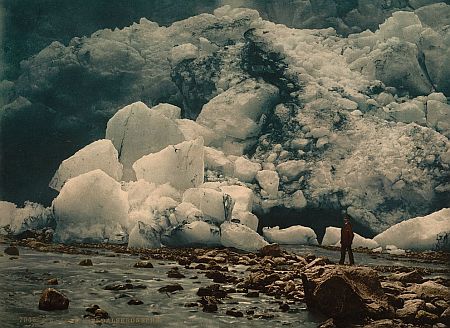
Loen, Kjendalskronebrae
Nordfjord, Norway
Photochrom Prints
ca. 1890-1905
available in high res
Library of Congress
Photochrom Travel Views
Library of Congress on flickr
_______________________
The Physics of Copenhagen
Bill McKibben
When it comes to global warming ... this is precisely why we’re headed off a cliff, why the Copenhagen talks that open this week, almost no matter what happens, will be a disaster. Because climate change is not like any other issue we’ve ever dealt with. Because the adversary here is not Republicans, or socialists, or deficits, or taxes, or misogyny, or racism, or any of the problems we normally face -- adversaries that can change over time, or be worn down, or disproved, or cast off. The adversary here is physics.(....)
... even the best politicians are treating the problem of climate change as a normal political one, where you halve the distance between various competing interests and do your best to reach some kind of consensus that doesn’t demand too much of anyone, yet reduces the political pressure for a few years -- at which time, of course, you (or possibly someone entirely different) will have to deal with it again.
Obama is doing the same thing with climate change that he did with health care. He’s acting with complete political realism, refusing to make the perfect the enemy of the good (or, really, the better-than-Bush). He’s doing what might make sense in almost any other situation.
Here, unfortunately, the foe is implacable. Implacable foes emerge rarely. The best human analog to the role physics is playing here may be fascism in the middle of the last century. There was no appeasing it, no making a normal political issue out of it. You had to decide to go all in, to transform the industrial base of the country to fight it, to put other things on hold, to demand sacrifice....(more)
_______________________

Nicholas Hughes
Unless You Will - issue 2
curated and founded by Heidi Romano
_______________________
How Science Blew the 'Climategate' Attack
Colleen Kimmett
tyee
"Science by itself has no impact. It has to be translated into a compelling political story to make a difference," said Judith Layzer, a professor of environmental policy at MIT and a panelist at a recent forum titled "The Great Climategate Debate."(....)
Yet, in this great public policy debate that is based on scientific understanding of the natural world, the scientists themselves have failed to take control of their own narrative. Climategate was an opportunity for scientists to clearly define their own role in the public sphere. Instead they let it get away from them.
The content of the hacked emails hasn't changed the prevailing scientific wisdom that human-caused carbon dioxide drives global warming. And most scientists and analysts agree it won't have much bearing on the outcome of the agreements. But the way in which this story played out -- fodder for deniers, a juicy scandal for the press --- has forced the scientific community to take a good hard look at what they, and the public, could learn from it....(more)
This Is How You Fuel a Community of Climate DeniersStart with big oil companies, and the money and connections flow. Donald Gutstein excerpted from Not A Conspiracy Theory: How Business Propaganda Hijacks Democracy by Donald Gutstein
_______________________

Cul-de-sac, Antioch
2008
Larry Sultan
1946 - 2009
Reconstructing Family: Larry Sultan's Pictures from Home
Merriah Lamb
_______________________
The Theory of Signs and the Role of the Reader
Umberto Eco
The Bulletin of the Midwest Modern Language Association, Vol. 14, No. 1. (Spring, 1981)
aaaarg- free reg. req.
In order to determine how and to what extent a text can direct its possible interpretations, a pre-textual theory of language, that is a theory of signs, is needed. This must be a theory in which the notion of the linguistic sign must be addressed in such a way that the textual destiny of the sign is recognized; a junction between a theory of signs and a theory of texts can then be achieved.
Is there, however, a theory of signs? Semiotics has been defined as a theory of signs by all the authors who have conceived of it, from the Stoics to Roger Bacon, from Francis Bacon to Locke, from Lambert to Husserl, not to speak of Saussure, Peirce, Morris, or Barthes. However, as we know, contemporary cultural discourse is pervaded with toastsfun>bres of all kinds (Marx is dead; Freud is dead; Structuralism is dead; God ...it goes without saying; and Nietzsche is in serious need of medical care). It has therefore become fashionable, in the last decade, to announce not only the death but also the absolute inexistence of signs. "La mort du cygne" is the song opening many semiotic soap operas.
(....)
Signs, then, are not dead. What is dead is the degenerate notion of linguistic sign as synonymy and definition. The caretakers of the sign in fact killed and buried the dead and fictive product of a defunct semiotics. Mallarm&, on the other hand, knew that it was sufficient to name a flower to arouse in the mind of any virtual reader, out of the forgetfulness where our voices banish any contour, many absent fragrances.
_______________________
more Umberto Eco at aaaarg
Serendipities: Language & Lunacy
Umberto Eco
translated by William Weaver
Kant and the Platypus: Essays on Language and Cognition
Innovation & Repetition: Between Modern & Postmodern Aesthetics
Daedalus Fall 2005
_______________________
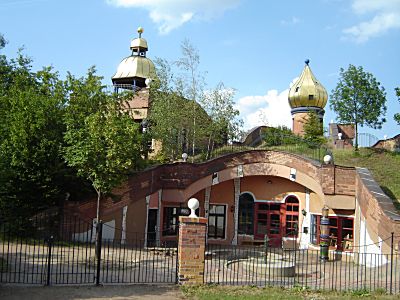
Kindergarten in Frankfurt am Main-Heddernheim
Friedensreich Hundertwasser
Austrian painter, architect, designer and ecologist
Dec. 15, 1928 - Feb. 19, 2000
Friedensreich Hundertwasser - Wikimedia Commons
_______________________
Psychiatry's civil war
New Scientist
When doctors disagree with each other, they usually couch their criticisms in careful, measured language. In the past few months, however, open conflict has broken out among the upper echelons of US psychiatry. The focus of discord is a volume called the Diagnostic and Statistical Manual of Mental Disorders, or DSM, which psychiatrists turn to when diagnosing the distressed individuals who turn up at their offices seeking help. Regularly referred to as the profession's bible, the DSM is in the midst of a major rewrite, and feelings are running high....(more)
_______________________
Rain Taxi's Benefit Auction
Books by
Diane Ackerman, Paul Auster, Nicholson Baker, Charles Baxter, Gabrielle Bell, Richard Brautigan, Robert Olen Butler, Thomas Frank, Neil Gaiman, Jaime Hernandez, Steve Martin, Harry Mathews, Lorrie Moore, John Porcellino, Edward Sanders, Gertrude Stein, Dara Wier, David Wroblewski, Adam Zagajewski
Broadsides, Chapbooks, and Special Items by
M.T. Anderson, Jan Brett, Stephen Dixon, Russell Edson, Brian Evenson, Robert Hass, Gerard Malanga, Paul Metcalf, Alice Notley, Wang Ping, Donald Revell, Buzz Spector & Marjorie Welish, Nathaniel Tarn, James Tate, Anne Waldman, Keith Waldrop, Rosmarie Waldrop
Rain Taxi: Review of Books
via NewPages
_______________________
from
The Book Of The Dead
Muriel Rukeyser
Past all your influences, your home river,
constellations of cities, mottoes of childhood,
parents and easy cures, war, all evasion’s wishes.
What one word must never be said?
Dead, and these men fight off our dying,
cough in the theatres of war.
What two things shall never be seen?
They : what we did. Enemy : what we mean.
This is a nation’s scene and halfway house.
What three things can never be done?
Forget. Keep silent. Stand alone.
The hill of glass, the fatal brilliant plain.
The facts of war forced into actual grace.
(....)
Carry abroad the urgent need, the scene,
to photograph and to extend the voice,
to speak this meaning.
Voices to speak to us directly. As we move.
As we enrich, growing in larger motion,
this word, this power.
Down coasts of taken countries, mastery,
discovery at one hand, and at the other
frontiers and forests,
fanatic cruel legend at our back and
speeding ahead the red and open west,
and this our region,
desire, field, beginning. Name and road,
communication to these many men,
as epilogue, seeds of unending love.
...(more)
A Mater of Fact and Vision: The Objectivity Question and Muriel Rukeyser's "The Book of the Dead"
Shoshana Wechsler Twentieth Century Literature, Jan, 1999
Muriel Rukeyser Goes to War:
Pragmatism, Pluralism, and the Politics of Ekphrasis
Raphael C Allison _______________________
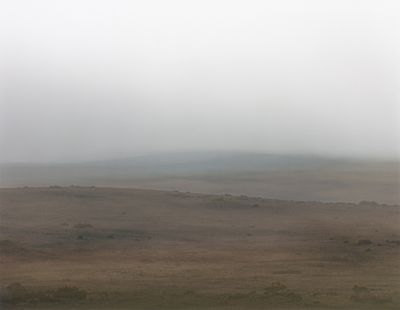
Field
Nicholas Hughes

Andrej Krementschouk
photographer.ru
_______________________
At the Window
Paul Eluard
I have not always had this certainty, this pessimism which reassures the best among us. There was
a time when my friends laughed at me. I was not the master of my words. A certain indifference, I
have not always known well what I wanted to say, but most often it was because I had nothing to
say. The necessity of speaking and the desire not to be heard. My life hanging only by a thread.
There was a time when I seemed to understand nothing. My chains floated on the water.
All my desires are born of my dreams. And I have proven my love with words. To what fantastic
creatures have I entrusted myself, in what dolorous and ravishing world has my imagination
enclosed me? I am sure of having been loved in the most mysterious of domains, my own. The
language of my love does not belong to human language, my human body does not touch the flesh
of my love. My amorous imagination has always been constant and high enough so that nothing
could attempt to convince me of error.

Paul Éluard
(14 December 1895 – 18 November 1952)
Twenty-Four Poems
Paul Éluard
Translated by A. S. Kline
Éluard's Clock of Secret Weddings and Memories and the Present
translated by Lisa Lubasch
Green Integer Review
Surrealist Painters and Poets: An Anthology
Mary Ann Caws
google books
_______________________
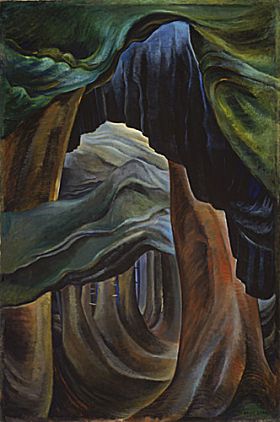
British Columbia
1931 - 1932
Emily Carr
To the Totem Forests:
Emily Carr and Contemporaries Interpret Coastal Villages
_______________________
The Two Lönnrots
Gabriel Josipovici
litro
As Borges lay dying his mind filled with images of lakes, of vast forests of spruce and pine, an enormous sky. He knew this was Finland, a country he had never visited, but which in these last years had been closer to his heart even than the streets of Buenos Aires in which he had grown up and about which he had written so much and so well. Lönnrot, he thought, and the figure of the poor tailor’s son who had risen to become the foremost collector of Finnish folk songs and tales, the Walter Scott, the Grimm Brothers, the Bartok of Karelia, passed before his mind’s eye, for it was in the pages of the Kalevala, that strange approximation to a national epic put together by Elias Lönnrot after years of wandering and collecting in the north-eastern region of his country, that he had encountered the landscape of Finland which had never afterwards left him and to which he returned again and again as he had once returned to the pampas and gauchos of his native land. He had been so taken by this strange man with his strange name that he had given it to the hero of one of the stories he felt proudest to have written, ‘Death and the Compass’....(more)
via Stephen Mitchelmore
_______________________
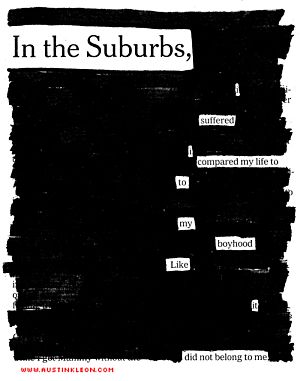
Newspaper Blackout Poems
Austin Kleon
via Rhys Tranter
_______________________
A Brief History of Erasure Poetics
Travis Macdonald
jacket
... take a cue from Austin Kleon; simply pick up a newspaper and a sharpie, read carefully and start making your mark.
_______________________
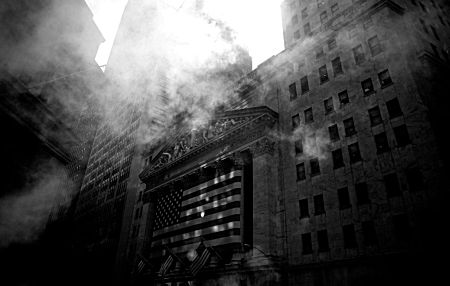
Wall Street
Benjamin Norman
_______________________
Hollywood’s Brilliant Coda to America’s Dark Year
Frank Rich on "Up in the Air"
Here is an America whose battered inhabitants realize that the economic deck is stacked against them, gamed by distant, powerful figures they can’t see or know. “Up in the Air” may be a glossy production sprinkled with laughter and sex, but it captures the distinctive topography of our Great Recession as vividly as a far more dour Hollywood product of 70 years ago, “The Grapes of Wrath,” did the vastly different landscape of the Great Depression.
What gives our Great Recession its particular darkness — and gives this film its haunting afterlife — is the disconnect between the corporate culture that is dictating the firing and the rest of us. In the shorthand of the day, it’s the dichotomy between Wall Street and Main Street, though that oversimplifies the divide. This disconnect isn’t just about the huge gap in income between the financial sector and the rest of America. Nor is it just about the inequities of a government bailout that rescued the irresponsible bankers who helped crash the economy while shortchanging the innocent victims of their reckless gambles. What “Up in the Air” captures is less didactic. It makes palpable the cultural and even physical chasm that opened up between the two Americas for years before the financial collapse.
The private-equity deal makers who bought and sold once-solid companies like trading cards, saddling them with debt, never saw the workers whose jobs were shredded by their cunning games of financial looting. The geniuses in Washington and on Wall Street who invented junk mortgages and then bundled and sold them as securities didn’t live in the same neighborhoods as the mortgagees, small investors and retirees left holding the bag once the housing bubble burst.
Those at the top are separated from the consequences of their actions. ...(more)
_______________________
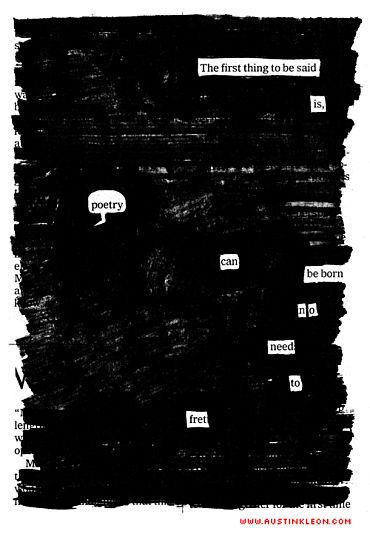
Austin Kleon
_______________________
Hume's Melancholy
Dylan Trigg
Side Effects
Your shadow falls over time, marking the places and times that have been affected by your presence. How to account for these anonymous blocks of experience you’ve been accruing? You are alive—you fended off the void radiating in the spaces between sensations. Through your own work and effort, you managed to sculpt your life into a totality, the parts of which sufficiently resemble one another so at to give the impression that their agency is orientated toward a common goal: “Suppose we could see clearly into the breast of another, and observe that succession of perceptions…’tis evident that could more contribute to the bestowing a relation on this succession amidst all its variations” (308)....(more)
_______________________

Pierre Puvis de Chavannes
(14 December 1824 – 24 October 1898)
_______________________
Go inside a stone
That would be my way.
Let somebody else become a dove
Or gnash his teeth inside a tiger.
I am happy with a stone.
From the outside the stone is a riddle;
No one knows how to answer it.
Yet within, it must be cool and quiet
Even though a cow steps on it full weight,
Even though a child throws it in a river;
The stone sinks, slow, unperturbed
To the river-bottom
Where the fishes come to knock on it
And listen with eyes of dead roosters.
I have seen sparks fly out
When two stones are rubbed.
So perhaps, it is not dark inside after all.
Perhaps, there is a moon shining
From somewhere, as behind a hill;
Just enough light to make out
The strange writings, the star-charts
On the inner walls.
- Charles Simic
Chicago Review
19:2 Winter 1967
 Pastoral
Alexander Gronsky
_______________________
In the footsteps of the walking air
Kenneth Patchen
In the footsteps of the walking air
Sky's prophetic chickens weave their cloth of awe
And hillsides lift green wings in somber journeying.
Night in his soft haste bumps on the shoulders of the abyss
And a single drop of dark blood covers the earth.
Now is the China of the spirit at walking
In my reaches.
A sable organ sounds in my gathered will
And love's inscrutable skeleton sings.
My seeing moves under a vegetable shroud
And dead forests stand where once Mary stood.
Sullen stone dogs wait in the groves of water…
Though the wanderer drown, his welfare is as a fire
That burns at the bottom of the sea, warming
Unknown roads for sleep to walk upon.

Kenneth Patchen
(December 13, 1911 - January 8, 1972)
Selected poems
Kenneth Patchen
google books
Kenneth Patchen at the Kerouac Alley
Kenneth Patchen at The Poetry Foundation
Kenneth Patchen, Naturalist of the Public Nightmare
Kenneth Rexroth
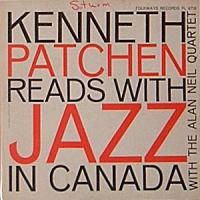
Kenneth Patchen - Reads with Jazz in Canada
Vancouver's Alan Neil Quartet
Smithsonian Folkways, 1959
mediafire download
The Never Complete Discography #2: Kenneth Patchen
By Chance Upon Waking
Kenneth Patchen — Poetry and Jazz days, 1957–1959
Larry Smith
jacket
_______________________

Antoni Tàpies
b. Dec. 13, 1923
_______________________
War in the Age of Intelligent Machines
Manuel De Landa
aaaarg - free reg. req.
_______________________
An Interview with Marshall Berman
Tony Monchinski
... there is a paradox in fundamentalism. Every religion in the twentieth century is polarized: on the one hand it's more humanistic and inclusive, on the other hand it's more tribal, rigid and exclusive. Part of the exclusion is that not only does it exclude people from other religions but it also excludes most of the people from the religion itself. For example, to a Christian fundamentalist, most Christians turn out not to be true Christians; for a Muslim fundamentalist, most Muslims turn out not to be true Muslims.
All fundamentalisms have a depressingly similar structure. It's easier for them [varying religious fundamentalists] to talk to one another and they have more in common with one another than they do with other Jews, other Hindus, other Christians, etc. But Fundamentalism is a very modern idea. It takes traditions that are thousands of years old and rejects almost all of them, conceptualizing a few of them and putting them into a system. It then judges all life according to that system.
Fundamentalism uses very modern forms of cognitive operations: it's not the only modern way to see things, but it is certainly one of the ways to see things. Fundamentalism is also open to modern technology. It's extremely avant-garde, so that in many religions the most sophisticated computer technologists are fundamentalists. In a sense Fundamentalists are more willing to buy into certain forms of modern technology more uncritically than secular humanists like myself. Willing to buy into anything if it will put forth their idea of the faith.
(....)
T.M.: Your All That Is Solid Melts Into Air is a ringing defense of modernity. For many segments of the left, Post Modernism is a specious concept. What, if anything, should we (the left) take from Post Modernism?
M.B.: I guess the most attractive quality in it is skepticism towards everything. That's something we should always carry around with us. We should always be self-scrutinizing and self-critical.
But I don't think many of the Post-Modernists themselves have actually done that. Part of the thing that is so infuriating to me about the Post Mods is the total lack of self-criticism, so that they can see how all previous thought was complicit in this and that -- which is often certainly true -- except for them. The idea that is impossible to tell the truth about anything except this. The naiveté with which they did this was attractive to many people, except me. I think Nietzsche is a very good teacher in that way, in that he shows we must say to ourselves, what if the opposite is true, instead of what I think?...(more)
Freedom and Fetishism
Marshall Berman
“The world,” says Wittgenstein, “is all that is the case.” Labour power, capital, commodities, surplus-value: these Tatsachen encase the world of the bourgeoisie. But there is something odd about this world: its “atomic facts” serve as its basic values as well. All possible descriptions have prescriptions built in; words themselves define the “proper” attitude to be adopted toward all the things they describe — and thus save men the trouble of morally making up their minds. But if, as we said above, freedom is logically bound up with choice; and if the capitalist outlook on the world tends to evade choice; and if, as Marx wrote in 1842, “Morality rests on the autonomy, religion on the heteronomy of the spirit” — then it is clear that it is as a religion, and not as a morality, that capitalist fanaticism must be understood.
This is precisely the sort of explanation Marx is attempting in his discussion of the “fetishism of commodities”:
... we must have recourse to the mist-enveloped regions of the religious world. In that world the productions of the human brain appear as independent beings endowed with life, and entering into relation both with one another and with the human race. So it is in the world of commodities with the products of men’s hands ... (Capital, 83).
The function of fetishism, and of religion in general, is to relieve the believer of responsibility for his actions. It is not he who is acting, it is the God (or daemon) who is acting in and through him; he cannot criticise, modify or change the world; he, like the world itself, is merely the vehicle of an alien Will. Similarly, the capitalist denies that it is in his power even to try to alter the ruinous processes of the market: it operates according to “eternal laws” to which he and all men are helplessly subjected. The fiction of Natural Law — which plays on all the ambiguities of both “nature” and “law,” and through which descriptive and normative discourse are fused — is immensely powerful in keeping men riveted to their roles. ...(more)
All that is solid melts into air: the experience of modernity
Marshall Berman google books
_______________________
A YEAR -CCCXLV
John Latta
Isola di Rifiuti
The sentence is one of
several necessary and heterogeneous vehicles
of a peculiar means of
thinking oneself into regions heretofore
abscond’d by wit, look’d at
asquint by syntax, or declined by
the plotz’d evidential roisterers of
the physical world. Its periodic
momentum abjures rhythm and regularity
and bolsters, clausal or adjectival,
plump’d up under its skinny
length get add’d at whim,
or subtract’d in a misconstrued
fit of convenience and regimen,
some word needing a propping
up somewhere down the line.
...(more)
_______________________
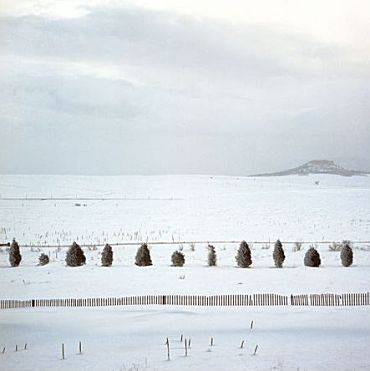 Western Frieze
Bryan Schutmaat
_______________________
In the detail?
Extracts from Kuoleman ja unohtamisen aikakirjat (‘Chronicles of death and oblivion’
Kari Enqvist
Translated by David Hackston
Books from Finland
As a young boy I must have held religious beliefs. However, I cannot pinpoint exactly when they disappeared. At some point I eventually stopped saying my evening prayers, but I am unable to remember why or when this happened. 'I was born in a time when the majority of young people had lost faith in God, for the same reason their elders had had it - without knowing why,' writes the Portuguese poet Fernando Pessoa in The Book of Disquiet.
When I was reading the Christmas story aloud, I didn't believe in it. Although I know it cannot be true, I have the feeling that I have in fact never believed in God. My memory does not stretch back as far as my childhood so I cannot say what I thought back then or what kind of child I was. It is as though I have forgotten myself, as though the connection to that little boy is nothing but a construction, a play that in the deepest recesses of my ego I perform for my own gratification. It is for these reasons that my religious Bildungsroman is one not a story of relinquishing but of forgetting....(more)
_______________________
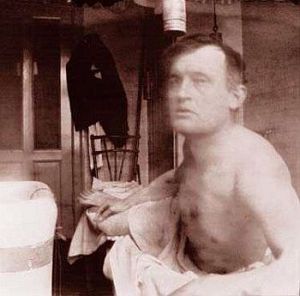
Edvard Munch
December 12, 1863 – January 23, 1944
_______________________
Javier Marías interview
Javier Marías: I think it was Faulkner who once said that when you strike a match in a dark wilderness it is not in order to see anything better lighted, but just in order to see how much more darkness there is around. I think that literature does mainly that. It is not really supposed to “answer” things, not even to make them clearer, but rather to explore — often blindly — the huge areas of darkness, and show them better. So in my opinion it does not really matter if subjects are unanswerable (all of them are, possibly), as literature is not expected to solve riddles or mysteries, but just to show them — perhaps putting them in a slightly new light, perhaps calling attention to overlooked aspects of them.
FP: Do your dual roles as a writer and an English-Spanish translator intersect?
JM: I have not translated a book in the last 20 years or so. Writing and translating are too similar to cope with at the same time. What I can say is that translation is the best possible school for a writer. If you are capable of “rewriting” acceptably (that is what a translator does, he or she rewrites) texts by Laurence Sterne or Joseph Conrad or Thomas Browne, it means you have learned a lot, it means that your instrument or tool is ready for rather ambitious enterprises. Of course, translating does not give you talent or imagination, but it tunes your instrument — language — and that’s a lot....(more)
The Limits of Human Memory: On Proust and Javier Marías
Jordan Anderson What is also frighteningly evident in Proust's and Marías's delineations of the effects of time on human beings is that, as a defense mechanism, humans will inevitably deceive themselves into believing that they can indeed "know" a great deal about the past, or of the world around them, creating in this false and desperate need of certainty an internecine world which is constantly tearing itself apart....(more)
_______________________
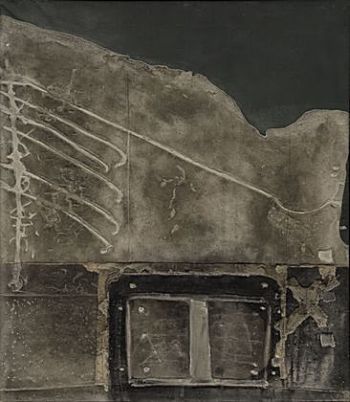
Antoni Tàpies
_______________________
The Rites of Darkness
by Kenneth Patchen
The sleds of the children
Move down the right slope.
To the left, hazed in the tumbling air,
A thousand lights smudge
Within the branches of the old forest,
Like colored moons in a well of milk.
The sleds of the children
Make no sound on the hard-packed snow.
Their bright cries are not heard
On that strange hill.
The youngest are wrapped
In cloth of gold, and their scarfs
Have been dipped in blood.
All the others, from the son
Of Tegos, who is the Bishop
Of Black Church—near Tarn,
On to the daughter of the least slut,
Are garbed in love's shining dress;
Naked little eels, they flash
Across the amazed ice.
And behind each sled
There trots a man with his sex
Held like a whip in his snaking hand.
But no one sees the giant horse
That climbs the steps which stretch forth
Between the calling lights and that hill
Straight up to the throne of God.
He is taller than the highest tree
And his flanks steam under the cold moon.
The beat of his heart shakes the sky
And his reaching muzzle snuffles
At the most ancient star.
*
The innocent alone approach evil
Without fear; in their appointed flame
They acknowledge all living things.
The only evil is doubt; the only good
Is not death, but life. To be is to love.
This I thought as I stood while the snow
Fell in that bitter place, and the riders
Rode their motionless sleds into a nowhere
Of sleep. Ah, God, we can walk so easily,
Bed with women, do every business
That houses and roads are for, scratch
Our shanks and lug candles through
These caves; but, God, we can't believe,
We can't believe in anything.
Because nothing is pure enough.
Because nothing will ever happen
To make us good in our own sight.
Because nothing is evil enough.
*
I squat on my heels, raise my head
To the moon, and howl.
I dig my nails into my sides,
And laugh when the snow turns red.
As I bend to drink,
I laugh at everything that anyone loves.
All your damn horses climbing to heaven
_______________________
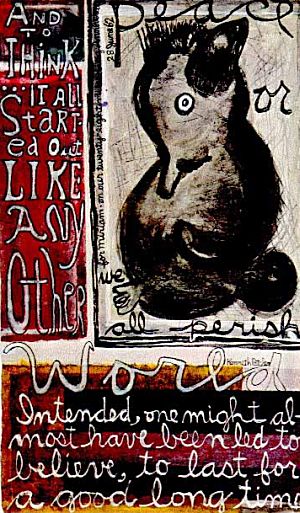
Painted and Silkscreened Poems
by Kenneth Patchen

Felix Nussbaum
1935
_______________________
The Chronic Dependence of Popular Religiosity upon Dysfunctional Psychosociological Conditions [pdf]
Gregory Paul
Evolutionary Psychology - 2009. 7(3)
Are we better off without religion?
Sue Blackmore
In this latest research Paul measures "popular religiosity" for developed nations, and then compares it against the "successful societies scale" (SSS) which includes such things such as homicides, the proportion of people incarcerated, infant mortality, sexually transmitted diseases, teenage births and abortions, corruption, income inequality, and many others. In other words it is a way of summing up a society's health. The outlier again and again is the US with a stunning catalogue of failures. On almost every measure the US comes out worse than any other 1st world developed nation, and it is also the most religious.
For this reason Paul carries out his analysis both with and without the US included, but either way the same correlations turn up. The 1st world nations with the highest levels of belief in God, and the greatest religious observance are also the ones with all the signs of societal dysfunction. These correlations are truly stunning. They are not "barely significant" or marginal in any way. Many, such as those between popular religiosity and teenage abortions and STDs have correlation coefficients over 0.9 and the overall correlation with the SSS is 0.7 with the US included and 0.5 without. These are powerful relationships. But why?
(....)
Contrary to Dan Dennett, Pascal Boyer and others, he argues that religion is not a deep-seated or inherited tendency. It is a crutch to which people turn when they are under extreme stress, "a natural invention of human minds in response to a defective habitat". Americans, he says, suffer appalling stress and anxiety due to the lack of universal health care, the competitive economic environment, and huge income inequalities, and under these conditions belief in a supernatural creator and reliance on religious observance provides relief. By contrast, the middle class majorities of western Europe, Canada, Australia, New Zealand and Japan have secure enough lives not to seek help from a supernatural creator....(more)
_______________________
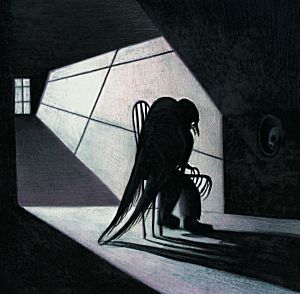
Lorenzo Mattotti & Lou Reed - The Raven
Galerie Martel
Lorenzo Mattotti
via A Journey Round My Skull
_______________________
I felt a Funeral, in my Brain,
And Mourners to and fro
Kept treading – treading – till it seemed
That Sense was breaking through –
And when they all were seated,
A Service, like a Drum –
Kept beating – beating – till I thought
My Mind was going numb –
And then I heard them lift a Box
And creak across my Soul
With those same Boots of Lead, again,
Then Space – began to toll,
As all the Heavens were a Bell,
And Being, but an Ear,
And I, and Silence, some strange Race
Wrecked, solitary, here –
And then a Plank in Reason, broke,
And I dropped down, and down –
And hit a World, at every plunge,
And Finished knowing – then –
-
Emily Dickinson
b. Dec. 10, 1830
_______________________

"Organ-Grinder"
1942/1943
Felix Nussbaum
December 11, 1904 – 1944 (Auschwitz)
1 2
The reconstruction of a forgotten painter's career can be one of the most beautiful acts of scholarship. Jan Vermeer remains the classic case, unknown when he lived in the 17th century, ignored through the 18th, and finally revealed to the world by scholars late in the 19th. Lyubov Popova, a Russian abstractionist, is a less famous example, but still impressive--her art was banned by the Soviets after she died in 1924 and remained unknown till collectors and scholars rediscovered it half a century later. And then there's the remarkable case of Felix Nussbaum, in whose honour a museum will open this July 16 in his home town, Osnabrück, a small industrial city in northwest Germany. Breathing fresh life into an artist's dead reputation requires intelligence, persistence, and a detective's shrewdness. Nussbaum's case was especially hard, since he lived in hiding for years, painted in secret, and left his work in the hands of people who were often untrustworthy. He was a victim of the Nazis, killed at Auschwitz, but he was also a brilliant chronicler of the Holocaust. The museum, containing 140 works, will be his personal triumph over history; it will also stand as Osnabrück's Holocaust memorial, used to tell the story to Germans of the future.
-
Robert Fulford
Felix Nussbaum and the Art of Resistance
John Felstiner
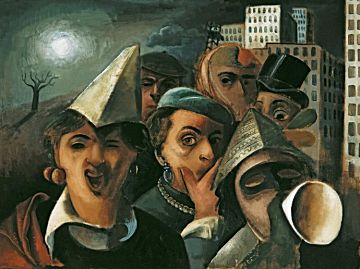
Masquerade
c.1939
Felix Nussbaum
_______________________
Foucault's Dream: The Irony of Genealogy and Subjectivity
Mark D. Tschaepe
Janus Head - Fall 2000
The task of rediscovering the subject's identity (definition) in the world is the basis of Foucault's work, consisting of tearing away the imposed categories and masks that have been placed upon the subject, defining the subject as a subject of the world. The method he utilizes to find the subject is one he inherits from Nietzsche, genealogical in presentation and archaeological in execution. Unlike Nietzsche, however, Foucault does not impose positive theory upon his genealogical analysis. In fact, he must refrain from commenting on the meaning of the subject within his "fictional histories," for the act of commenting not only erases what has been revealed, but places the theorist in a position of being seemingly outside of subjectivity. What is seen (by the genealogist) never resides in what is said about what is seen.16 Due to this paradoxical tension of being the writer of that which cannot be written, Foucault opts to juxtapose historical materials, allowing irony to be discovered by the reader.
In fact, excessive action in one direction usually sets up a reaction in the opposite direction.
From Madness & Civilization through the History of Sexuality, the writer does not state the inherent conflicts between that which is expected and that which occurs within a specific domain of knowledge, but rather, the reader discovers, through the placement of historical data, that what has been intended has the opposite effect. The cause of the attempt, the origin of a specific field of knowledge itself, must attempt to remedy this undesired effect ad infinitum, constantly redefining itself according to that which it tries to bring under its control. The outcome of using this method of criticism is the realization that the fields of discourse with which Foucault concerns himself are, in fact, self-critical. The fields he searches through reveal their own ironies, presenting not histories of progression, but histories of both giving birth to their own problematizations and their continual efforts to remedy those problems which arise from the effects of discourse. Foucault, upon placing his found information into a particular order (as the archaeologist does with his discovered objects of the past), unmasks that which is seemingly absolute as inherently contingent and oppressive, elusive and ever-changing, subjugating the subject as a specific type of subject while claiming to liberate the individual....(more)
_______________________

Cavern of Crystal Giants
Naica Mine in Chihuahua, Mexico
natiional geographic
Photograph by Carsten Peter
_______________________
Là-Bas
(Down There)
J.K. Huysmans
Translated by Keene Wallace
Original published 1891,
English translation privately published 1928.]
"You shrug your shoulders, but tell me, how much has naturalism done to clear up life's really troublesome mysteries? When an ulcer of the soul—or indeed the most benign little pimple—is to be probed, naturalism can do nothing. 'Appetite and instinct' seem to be its sole motivation and rut and brainstorm its chronic states. The field of naturalism is the region below the umbilicus. Oh, it's a hernia clinic and it offers the soul a truss!
_______________________
The Signature of All Things: On Method [medifire pdf]
Giorgio Agamben
Translated by Luca D'Isanto & Kevin Attell
via Cross-X
The three essays published here contain my observations on three specific questions regarding method: the concept of the paradigm, the theory of signatures, and the relation between history and archaeology. If these observations appear to be investigations on the method of Michel Foucault, a scholar from whom I have learned a great deal in recent years, this is because one of the methodological principles not discussed in the book - and which I owe to Walter Benjamin - is that doctrine may legitimately be exposed only in the form of interpretation. The astute reader will be able to determine what in the three essays can be attributed to Foucault, to the author, or to both. Contrary to common opinion, method shares with logic its inability to separate itself completely from its context. There is no method that would be valid for every domain, just as there is no logic that can set aside its objects. _______________________
The Boys and Emily Dickinson
Doug Lasken
exquisite corpse
It is every public school teacher’s onus that the system serves the dual purposes of education and free day-care, but what wonderfully awful juxtapositions this affords, as on the Friday before a full moon weekend when I had scheduled my Emily Dickinson video. The audiences were periods four and five, alike only in their average age of 17. The periods differ in that period four, before lunch, is controlled by several literate girls, fascinated by Dickinson and not ashamed to say so, while period five is under the spell of four Russian boys, very much in the tradition of Aykroyd and Martin's “Wild and Crazy Guys.”
The video is quite well done, with lovely period music, beautiful images of home and country, and, of course, much somber recitation of Dickinson’s poetry. All you 60 year old Dickinson loving guys out there (and I know our numbers are mighty!) will appreciate the understated joy I felt in the rare period four setting, quietly catching up on my work against a background of “Moonlight Sonata” and lines like
"I cannot live with you-
It would be Life-
And Life is over there-
Behind the Shelf."
while boys dozed and girls in black leather jackets with silver studs, over T-shirts with audacious sayings, and knit gloves that showed knuckles, and ragged jeans manufactured that way, and pierced noses and lips, and spikey hair, and little make-up or lots of make-up, watched and listened raptly, their silence as much music to my ears as the sonorous soundtrack....(more)
_______________________
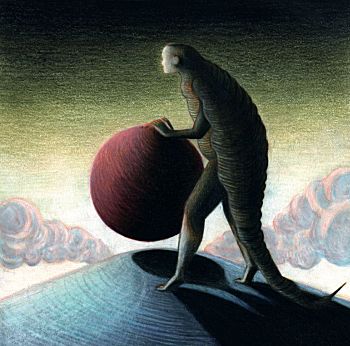
Lorenzo Mattotti
_______________________
SO gay a flower bereaved the mind
As if it were a woe,
Is Beauty an affliction, then?
Tradition ought to know.
-
Emily Dickinson
_______________________
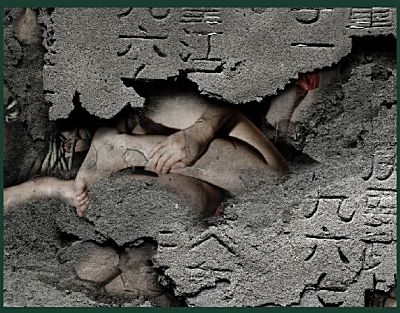
Tian Taiquan
1 2
via Joerg Colberg
_______________________
eXchanges
Exocity - Winter 2009
Journal of Literary Translation - The University of Iowa
from
Et in Arcadia
Agnieszka Kuciak
translated by Ewa Chruściel
(....)
Your letter’s found me again among words.
How are things? The whir of dictionaries.
Layer after layer I scrape the darkness
From a temple fresco. Or I travel
to the amiable antipodes in a small
paper boat. Again among words.
I’ve got loads to do, because the true spells
are written in a tongue which does not exist.
I know they exist, because I experience
daily miracles: he lives
and the beast returns to the sea.
Bright morning are fragrant with spring
I learn a tongue which does not exist.
6 Poems
Agnieszka Kuciak
translated by Ewa Chruściel & Eliżbieta Kotkowska
_______________________
What Is Living and What Is Dead in Social Democracy?
Tony Judt
nyreview
adapted from a lecture given at New York University on October 19, 2009.
Americans would like things to be better. According to public opinion surveys in recent years, everyone would like their child to have improved life chances at birth. They would prefer it if their wife or daughter had the same odds of surviving maternity as women in other advanced countries. They would appreciate full medical coverage at lower cost, longer life expectancy, better public services, and less crime.
When told that these things are available in Austria, Scandinavia, or the Netherlands, but that they come with higher taxes and an "interventionary" state, many of those same Americans respond: "But that is socialism! We do not want the state interfering in our affairs. And above all, we do not wish to pay more taxes."
This curious cognitive dissonance is an old story. ...
(....)
... my concern tonight is the following: Why is it that here in the United States we have such difficulty even imagining a different sort of society from the one whose dysfunctions and inequalities trouble us so? We appear to have lost the capacity to question the present, much less offer alternatives to it. Why is it so beyond us to conceive of a different set of arrangements to our common advantage?
Our shortcoming—forgive the academic jargon—is discursive. We simply do not know how to talk about these things. To understand why this should be the case, some history is in order: as Keynes once observed, "A study of the history of opinion is a necessary preliminary to the emancipation of the mind." For the purposes of mental emancipation this evening, I propose that we take a minute to study the history of a prejudice: the universal contemporary resort to "economism," the invocation of economics in all discussions of public affairs....(more)
via Horner's Corner
_______________________
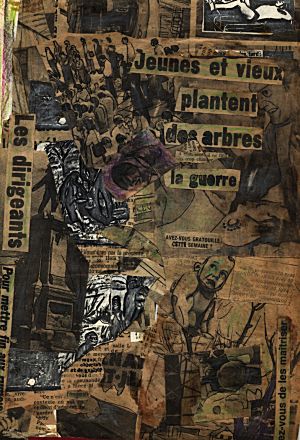
- a fool-
jean-claude gagnon
presented by jim leftwich
textimagepoem
_______________________
The Devil and Mr. Obama
Joe Bageant
But even if Americans understood socialism, they are too terrified to ever admit to its virtues, much less publicly support the cause. And without free and open public participation in some democratic form of socialism, regardless of the name or label given it, there can be no recognition of the people's common welfare and good. And so the most egalitarian social philosophy ever conceived dies within a nation, with very little chance of being reborn because such an ideal, by its definition, cannot exist within the narrow mindset of bankers and oligarchs.
Bush smirks, Obama breakdances in and around the minefield of his false promises, and Wall Street CEO bonuses are higher than ever.
Like I said, the Devil does take care of his own....(more)
_______________________
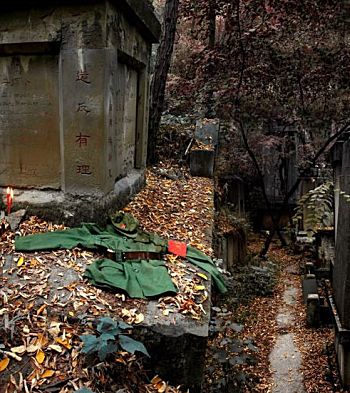
Tian Taiquan
_______________________
What's the 'Matter' with Materialism? Walter Benjamin and the New Janitocracy [pdf]
Dan Mellamphy and Nandita Biswas Mellamphy
janus head
The significant point for Benjamin is that, in having been forgotten, the discarded object nonetheless continues to exist apart from the continuum of progressive historical time. In being discarded, the object that had once been a part of the historical process as a reified or fetishized commodity, dies a social death; but it is precisely at the juncture in which it exists as a ‘has-been’ that its potential to reveal the ‘not-yet’ emerges (its chance to be ‘born[e] again’). This two-fold movement opens up within the object itself, and therefore it points to two dimensions: on the one hand, as an extinct and bygone object it is able to demystify the structure of progressive history by exposing its ‘mythic’ dimension. The once-fetishized object in its decayed and disabused/used form exposes the collective fantasy or ‘wish-image’ that had once made it a valued object of social desire. On the other hand, this demystification or demythification also points to the potential for change inherent in the obsolete object itself. This latter aspect constitutes its redemptive dimension: although it is ‘fallen’ or abjected, in the sense that the object is deemed no longer socially valuable, as an obsolete object or ‘ruin’, it nonetheless outlives its conventional collective social function. That which has been abjected or abandoned is addressed again or redressed (and thereby revived) through its extramythic or countermythological potential—its potential, in short, to stand outside the homogeneous continuum and mythological narrative of historical Janus Head 165 progression. These forsaken and forgotten objects simultaneously expose the ideological structure of bourgeois capitalist commodified culture (by falling into its margins and/or out of them completely) and also contain within them “a precious but tasteless seed”: the seed of their own temporal redemption.
_______________________
From Underground Sonnets
Sarah Riggs
conjunctions
Love Winter Too
Dear Earth take in this fairy breath. Let it
seep into the mischievous crannies, the
rooks and rocks. What is behind the lily,
the foregone conclusion? If we look
at the interstices, the common lines be-
tween sheets of rain. I wanted to write in-
to your heart but the chambers are closed.
What
freedom in the rain when memory is for
sale? What response to give a fairy? We
manage, nonetheless, a raucous cheer
with the Daily Show, a tempestuous
cloud of letters. Even with pomegran-
ate molasses to soften the duck: we
cannot change, the most we can do is
see.
.....................................................
Living among the offcuts
Tim Wright reviews Sarah Riggs' Waterwork and chain of minuscule decisions in the form of a feeling
Riggs’ work is germane to a period in which reading practices have become so seemingly randomized and brief, and distributed across so many types of media; a time in which we are living among those offcuts or errata slips of language. As has been often said of hypertext and new media writing, the poems externalize some of those mind processes to do with reading: the words link up in non-linear ways, they literally fade away, disappear, and re-occur. The sophisticated technical experiments employed seem less an encouragement to play the works than to register their visualized silences. Riggs work is a reminder that the ability to make words move and link up in unusual ways is not new to new media writing, and was already realisable in paper and ink.
Perhaps one of the lasting effects of chain of minuscule decisions... will be the offer it makes of a connection, a bridge, between the literary and visual experiment going on in France and in French, and its counterpart practitioners in the anglophone world. Both collections suggest ways that poetry might look if there is more of an intermedia conversation between the visual (or for that matter, the sound arts and electronic arts) and poetry. The collections are adamantly and self-consciously not ‘books of poems’; not, that is, collections of discrete, aesthetic objects, but use the technology of the book to make big, ambitious works of art in spite of, and with a sharp awareness of, the world’s irreducibility to language....(more)
_______________________

it is back
photo - mw
_______________________
Against Mirth
Spurious
I send W. a quotation from my reading. I think joy is a lack of understanding of the situation in which we find ourselves. Who said that?, W. says. Tarkovsky, I tell him. Write it in your notebook!, says W. There are some quotations we need to keep before us.
I send W. another, again from Tarkovsky:
I can't stand mirth. Cheerful people seem guilty to me, because they can't comprehend the mournful value of existence. I accept happiness only in children and the elderly, with all others I am intolerant.
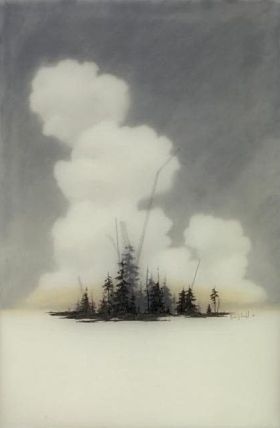
Plume #2
2009
Brooks Salzwedel
1 2
via riley dog
_______________________
a matter of degree /of unfast night/
Camille Martin
Rogue Embryo
experience and language as reciprocal … recognizing
to a matter of degree /of unfast night/
experience awakened: invent and receive … performance /recovered/ that recognizes multiple matters of degrees, an inclusive inventing, embracing also its emptiness–a matter and a transparency, slowly roiling … not /only/ language in the service of experience, experience and discourse timidly asleep together–an alchemy of experience into language, act of descriptive translation … capturing the present concludes it into an idea of the past, a convention of history … language supplying imagination limits the invented experience of language–or rather experience awakened to language … it sweeps itself unawares into a discourse of the clearly immortal even if unfamiliar … rather an unfast, a slow detached feast pausing for stretches into the quick of perception and collapsing the hierarchy of tenses … rather what Robin Blaser, writing of Jack Spicer, says “involves a reversal of language into experience, which is not a dialexis between ourselves or a discourse true only to itself, but a broken and reforming language which composes a ‘real’” … ...(more)
Camille Martin at the Electronic Poetry Center
_______________________
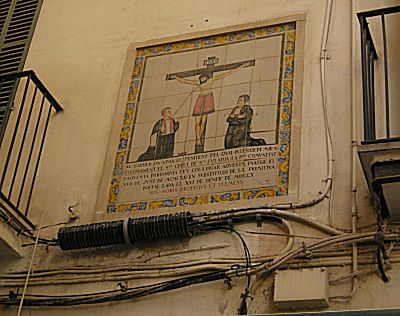
Electri city
Poemas del río Wang
"Whoever has ever a house built will know how ingenious the masters can be when it comes to bricolage. And the ancient craftsman’s sentence “this is how it reached it” will always be an apology for everything.
However, the electricians of Palma de Mallorca could give one lesson or two to any Hungarian master. This superlative of the trade can be pursued only in a Catholic country where there are enough saints for every wire. These pictures will make you understand without any further etymological expatiation the tight relationship between ingenio, genius and ingeniería, engineering."
_______________________
Record industry faces liability over `infringement'
Michael Geist
toronto star
The infringer has effectively already admitted owing at least $50 million and the full claim could exceed $60 billion. If the dollars don't shock, the target of the lawsuit undoubtedly will: The defendants in the case are Warner Music Canada, Sony BMG Music Canada, EMI Music Canada, and Universal Music Canada, the four primary members of the Canadian Recording Industry Association.(....)
After years of claiming Canadian consumers disrespect copyright, the irony of having the recording industry face a massive lawsuit will not be lost on anyone, least of all the artists still waiting to be paid. Indeed, they are also seeking punitive damages, arguing "the conduct of the defendant record companies is aggravated by their strict and unremitting approach to the enforcement of their copyright interests against consumers."...(more)
_______________________
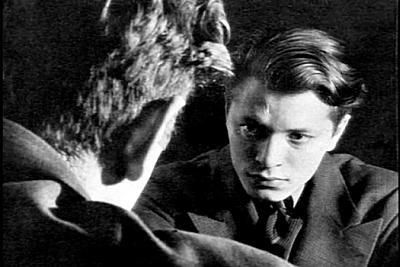
Delmore Schwartz
Dec. 8, 1913 - July 11, 1966
By Circumstances Fed
Delmore Schwartz
By circumstances fed
Which divide attention
Among the living and the dead,
Under the blooms of the blossoming sun,
The gaze which is a tower towers
Day and night, hour by hour,
Critical of all and of one,
Dissatisfied with every flower
With all that's been done or undone,
Converting every feature
Into its own and unknown nature;
So, once in the drugstore,
Amid all the poppy, salve and ointment,
I suddenly saw, estranged there,
Beyond all disappointment,
My own face in the mirror.
.....................................................
In Dreams Begin Responsibilities and Other Stories
Delmore Schwartz
google books
_______________________
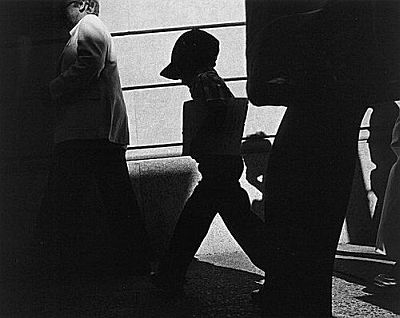
City Whispers
1981
Ray K. Metzker
1 2 3 4
_______________________
from
Then Calvin Thought That They Were Viewing Life through Beveled Glass
Jackson Mac Low
(September 12, 1922 – December 8, 2004)
Then Calvin thought that creatures going to green events, carelessly intending to enjoy the exaltation of replying exactly to a mounting wish when mental tears seem logical, are eager to spread coincidental roundness.
His idealistic education had endowed him with more than a fivepence Christmas box.
He hadn't yet come to doubt that chance would continually bring him delightful positions.
(...)
He knew that doubt could constitute much of a person's reality.
Some, when its borders are breached, are apt to turn dreamless or totally turn back as if they'd encountered an overbuttered porcupine.
Anyone may eagerly settle ingrained doubt when mixtures of models are offered even though dubious entities make them experience inner conflict.
Remember that some restricted physicists understand eyeglasses only, while others politely are tyrants.
Many play with unfastened universals.
Others beam when dressed in green, condemning the ones who are not.
A tragic few are influenced by électrónic grandeur.
They measure experience as if each moment of it were an arithmétic function of another one.
They're never aware of what really pleases them and what assuredly brings them down.
Because of their tactless education, the most circumspect idealism hasn't a chance of leading them into delightful positions.
Guided by no affectionate blows, but only by necessity, their awareness has no continuity, as if they were viewing life through beveled glass.
_______________________
Intentional Schizophrenia:
J.M. Coetzee’s Autobiographical Trilogy and the Falling Authority of the Author
Essay by Matthew Cheney
The Quarterly Conversation
_______________________

Chicago, 1958
Ray K. Metzker Automagic
Laurence Miller Gallery
via
_______________________
Tired And Unhappy, You Think Of Houses
Delmore Schwartz
Tired and unhappy, you think of houses
Soft-carpeted and warm in the December evening,
While snow's white pieces fall past the window,
And the orange firelight leaps.
A young girl sings
That song of Gluck where Orpheus pleads with Death;
Her elders watch, nodding their happiness
To see time fresh again in her self-conscious eyes:
The servants bring in the coffee, the children go to bed,
Elder and younger yawn and go to bed,
The coals fade and glow, rose and ashen,
It is time to shake yourself! and break this
Banal dream, and turn your head
Where the underground is charged, where the weight
Of the lean building is seen,
Where close in the subway rush, anonymous
In the audience, well-dressed or mean,
So many surround you, ringing your fate,
Caught in an anger exact as a machine!
_______________________

Electri city
Poemas del río Wang

Saint Vitus Cathedral
Josef Sudek
1925–28
_______________________
Excerpts from "Inserting the Mirror"
Rosemarie Waldrop
Given the distance of communication, I hope the words aren't just idling
on the map on
my fingertips, but igniting wild acres within the probabilities of spelling. As
a hawk
describes circles whose inner emptiness bespeaks the power of gravity,
where the lever
catches on a cog of the world. There, the mild foreground for buying bread,
for the
averted doubt that the hand will encounter. There, with dizzy attention, I
hold the be-
cause, another key to the bewitchment of words.
...(more)
HOW(ever)
Vol. 4, No. 2 (October, 1987)
_______________________

Rui Pires
_______________________
Consent and the Body: Injury, Departure, and Desire
Elaine Scarry
New Literary History, Vol. 21, No. 4 (Autumn, 1990)
pdf at aaaarg - free ref. req.
The phenomenon of consent is, as a verbal act, extremely protean: it continually slides in and out of varying conceptual locations such as contract, signature, partnership, promise, waiver, voting lever, warning, and warranty. So, too, its tonal range extends from the negative extreme of "acquiescence" and "privation" to the positive extreme of an affirmation so generative and profound that it is credited with bringing into being entire nations. Overburdened with meaning, the richness of its sites and citations may seem to suggest an instability or incoherence in the concept.
But as one scans across these various locations, it turns out that, far from being incoherent, there is a small and stable set of structural attributes residing at the center of its many invocations. This essay is called "Injury, Departure, and Desire" because it introduces three portraits of consent from three separate spheres-medicine, political philosophy, and marriage law-in order to identify a recurring set of structural elements: their shared emphasis on the human body, their purposeful mystification of active and passive, and their displacement of the contingent by the artifactual. Of these three, it is the first-the material anchoring of consent in the body-that is most crucial.
_______________________
from the massive aaaarg library
Julia Kristeva Essay Collection
Luce Irigaray Essay Collection
Helene Cixous Essay Collection
_______________________
Rae Armantrout
Like
1
She never said, “Look at that bush” or “Look at the sea; that’s a beautiful
bruise-blue perpetually subsiding.” She drew my attention to only a few
things: Xmas lights, The Last Days, Frontier Land.
2
“What it’s like
to be me.”
Where watch out
and report back
cross—
a stubborn eddy.
A tendency
to take exception?
How much of me
could be lost
while like remained?
Could like stand alone?
Does it?
...(more)
No: A Journal of the Arts
Rae Armantrout at EPC and PennSound
7 Poems
Rae Armantrout
Beard of Bees Publications
(#15: June, 2004)
_______________________
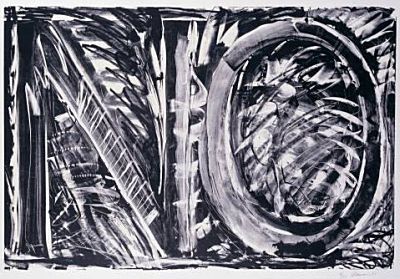
NO (Black State)
1981
Bruce Nauman
b. Dec. 6, 1941
_______________________
International Centre of Photography lecture archive
Video archive covers the period 2001-present, though not everything is online yet.
Audio archive covers the period 1974-2000
Live streaming of lecturers every Wednesday night. (USA Eastern time)
thanks to sherry cuttler at Photographs Do Not Bend
_______________________
The Future of Academic Journals in a Digital Age
Kyle Grayson
... current models of academic journal publishing that rely on limiting access to research through pay-walls are no longer sustainable.(....)
Primarily, pay-walls, an insufficient web presence, and a reluctance to embrace new social media technologies--whether out of a fear of the time commitment involved or a belief that these developments are a passing fad--combined with a reticence to adopt open access publishing and adapt revenue generating models will lead to significant negative impacts with respect to citation levels, overall readership, and the continuing ability to attract the very best scholarship....(more)
via David Campbell
_______________________

Time to rest ...
Rui Pires
Portugal
via Kiko's House
_______________________
Ping Poetics
Sandy Baldwin
Electronic Book Review
Ping is a drifting term for net communication. The blogosphere resemanticzed ping as a message pushed to servers from a blog announcing the blog is updated, leading to new forms of ping spam or sping. Artworks explore ping. In Pawel Janicki's "Ping Melody," performers improvise on voice and cello in response to mappings of internet pings (Janicki). Janiki claims the performance produces reflection on the techno-military structures of the internet. The imaginary projection in Janicki's aesthetic is the promise of the becoming-readable and discursivity of ping in the improvised performance. In Stelarc's "ping body," audiences could "remotely access, view and actuate [the artist's] body via a computer-interfaced muscle-stimulation system based at the main performance site" and cause random movements according to the space-time of pinging. The body moved in the "physical and collective space of the net" (Stelarc 1996).
When I say this is not - or hardly at all, ever so little - a text, when I say this is also a political statement, I am insisting on the stakes of the discourses we enter into, of the stakes involved were I to say (for example) that this writing is electronic literature. Of course we read narrative in this (k)not text. Look at my pathping: isn't it a compelling story? A high adventure? Engagement in Iraq and encounter with national security. I think of the late J. G. Ballard's disaster narratives or cracking the ice of the Eastern Seaboard Fission Authority. Suspense, international travel, geopolitical drama, ripped from the national news. I tell you this is a narrative. I can just make it out through the codes here. Even more, the codes add to it, suggest the insistence of the real behind the narrative. Isn't this insistence the case? Is this not a mapping of net, and with this a kind of mapping of the world? Is this not a story to read about global relations? The traces in the writing - the names of cities and locales, and my name - are a meta-code bringing this text into significance, locating the world in terms of my story. For instance, what's going on with those Iraqi servers, wonderfully named .iq? We could talk of the whole corrupt drama of marketing and capitalizing on reselling Iraqi nameservers.
This is a kind of theoretical knowledge, a discourse built on the response recognized in the pathping writing. Such a story recognizes the desire of the other at work in this writing. These are problems of boundaries, of constituting the subject of the net and the subject's knowledge of the net, of the internet protocol suite as the ontology of being online, and of what I give or donate to the net, rather than discursive problem of what we say of the net. I say that the flux and tolerance of maintaining the net is more important than the nodes and gates of communication. My ping is still out there, circulating in and out of the DoD net, whether the host responds or not. Packets move from host to host, in the same way. The net is indifferent; the ping is just another packet in the flow. The difference is the semantics of response and reading. In terms of IP, "destination unreachable" means "distance to the network is infinity."
The (k)not written into the net does not signify. Before the text is text I must already constitute the network, I must introject the net and the perception and knowledge of my being online as the condition of reading this text. I imagine the net. It is my fantasy. To read this writing as a text, towards all the others that compose it, to constitute me as a node in the net. The discovery that the text is the product of continual logging and processing in my computer means I read towards an anonymous other, a structural other that I posit or project across the space of the net.
I'm becoming hysterical. I'm hystericizing this discourse to you, I'm turning provocative. ...........(more)
_______________________

Why?
(1913)
Visualizing Ideology
Labor vs. Capital in the Age of Silent Films
_______________________
Through the Prism of Slavery: Labor, Capital, and World Economy
Dale W. Tomich
aaaarg
The immediate objective of these chapters is the interpretation of slavery as part of the historical formation of the capitalist world economy. In address ing this problem, however, they also raise methodological and conceptual issues whose resolutions have acquired a new urgency, in order not only to understand the past but also to comprehend the present. The profound social and economic transformations of the past thirty years have reintegrated all forms of class exploitation and coerced labor within new configurations of world market and states. The processes of globalization have provoked a variety of responses. One, of course, has been to simply abandon a historical perspective and to focus on the universal triumph of “the market” (itself conceived narrowly), which in its most extreme interpretation is identified with “the end of history”. In contrast, others have cautioned against overgeneralization about globalization and have emphasized historical shifts of regimes of accumulation as well as the importance of both geographical specificity and local difference. Through critical engagement with methodological and conceptual problems raised by slave labor (and, by extension, unwaged labor more generally), the chapters presented here contribute to a theoretical understanding of the historical development of the capitalist world economy as a whole. They not only call attention to the diversity and specificity of forms of labor that constitute the world economy, but by viewing capitalist development from the perspective of slave labor, the chapters also reveal spatial and temporal complexity and the production of local differences by world-scale processes. _______________________
The Blackwell Cultural Economy Reader
aaaarg
essays by Angela McRobbie, Sean O'Riain, Katie Vann and Geoffrey C. Bowker, Michel Callon, Ce´cile Me´adel and Vololona Rabeharisoa, Anna Tsing, Donald MacKenzie, Karin Knorr Cetina and Urs Bruegger, Frederico Varese, Lewis H. Lapham, Peter Miller, Paul Stoller, A. Hughes, Jonathan Murdoch and Mara Miele, Daniel Miller, Alison. J. Clarke, Haidy Geismar, Philip Crang, Arlie Hochschild, Lisa Law, S. Denton and R. Morris, and Celia Lury
_______________________

Rural Moments
Rui Pires
1 2

photo - mw
_______________________
In Cold Hell, In Thicket
Charles Olson
In cold hell, in thicket, how
abstract (as high mind is, as not lust, as love is) how
strong (as strut or wing, as polytope, as things are
constellated) how
strung, how cold
can a man stay (can men) confronted
thus?
Language even is made bitter, words
are made to taste like paper wars, get tossed up
like lead soldiers used to be
(in a child's attic) lined up
to be knocked down, as I am,
by firings from a spit-hardened fort,
as we are, here, from where we must go
God, that a man, as his acts must, as there is always a thing
he can do, he can raise himself, he raises
on a reed he raises his
Or, if it is me, what
he has to say
(....)
2
The branches made against the sky are not of use, are
already done, like snow-flakes, do not, cannot service
him who has to raise (Who puts this on, this dreaming of his flesh?)
he can, but how far, how sufficiently far can he raise the thickets of
this wilderness?
How can he change, his question is
these black and silvered knivings, these
awkwardnesses?
How can he make these blood-points into panels, into sides
for a king's, for his own
for a wagon, for a sleigh, for the beak of, the running sides of
a vessel fit for
moving?
How can he make out, he asks,
of this low eye-view,
size?
And archings traced and picked enough to hold
to stay, as she does, as he, the brother, when,
here where the mud is, hs is frozen, not daring
where the grass grows, to move his feet from fear
he'll trespass on his own dissolving bones, here
where there is altogether too much remembrance?
3
The question, the fear he raises up himself against
(against the same each act is proffered, under the eyes
each fix, the town of the earth over, is managed) is: __Who
am I?
Who am I but by a fix, and another,
a particle, and the congery of particles carefully picked one by another,
as in this thicket, each
smallest branch, plant, fern, root
- roots lie, on the surface, as nerves are laid open -
must now (the bitterness of the taste of her) be
isolated, observed, picked over, measured, raised
as though a word, an accuracy were a pincer!
this
is the abstract, this
is the cold doing, this
is the almost impossible
So shall you blame those
who give it up, whose who say
it isn't worth the struggle?
(Prayer
Or a death as going over to - shot by yr own forces - to
a greener place?
Neither
any longer
usable)
By fixes only (not even any more by shamans)
can the traceries
be brought out
...(more)
_______________________
Objects that Matter: Olson, Bergvall, and the Poetics of Articulation
Nathan Brown
how2
I want to look back at another missed opportunity in literary history, and forward to how we might re-frame the operation of gender and sexuality in contemporary experimental writing by recognizing the way in which what was missed “back then” may be more relevant than ever right now. So let me back up a bit, and begin with a simple question—one that, as I hope to show—is not unrelated to those so effectively posed by Spahr and Young. What if Charles Olson’s poetics were remembered today not under the banner of those well-worn categories—“Projective Verse,” “Open Field Poetry,” or “Black Mountain Poetry”—but rather by that other name that Olson also gave to his poetic practice: objectism. Would we think of Olson any differently if that term were the first association that came to mind when we heard his name? How might that association alter considerations of the pertinence of his work to contemporary poetry and poetics? And—the major question that I want to take up here—how might a contemporary practice of what Olson called “objectism” mobilize the approach to the body and the poem that that term entails, for an interrogation of differential genders and sexualities? What would have to change if that project—which I think is latent in Olson’s poetics—were moved from the background to the foreground? What would a feminist or a queer poetics of objectism look like and sound like?
Objectism is the central term of the so-called “stance toward reality” that Olson outlines in the second half of his 1950 manifesto, “Projective Verse.” He defines it as follows:
Objectism is the getting rid of the lyrical interference of the individual as ego, of the “subject” and his soul, that peculiar presumption by which western man has interposed himself between what he is as a creature of nature (with certain instructions to carry out) and those other creations of nature which we may, with no derogation, call objects. For a man is himself an object, whatever he may take to be his advantages. ...(more)
Caroline Bergvall at EPC and PennSound _______________________
Manhood and its Poetic Projects: The construction of masculinity in the counter-cultural poetry of the U.S. 1950s
Rachel Blau DuPlessis
Jacket 31 (October 2006)
_______________________

detail
Camilo Vergara
.....................................................
Images of Renewal and Decline
Robert A. Beauregard on Camilo Vergara
AMERICANSUBURB X
Vergara acknowledges the importance of images to how we understand, give meaning to, and act as regards cities. His main concern is the disinvestment and physical decay that triggered the need for reinvestment. More specifically, he asks his readers to consider how the past and present figure into our understandings of a city in decline and the importance of looking within, rather than without, for the seeds of renewal.
All of this is quite at odds with the images produced and disseminated by civic boosters. Vergara's work is critical; his goal is to reveal what happened and to remind us that people live in these circumstances. Survival is a persistent theme. The message is one of immanent hope rather than salvation through capital investments from afar.
The power of images lies in their ability to evoke deeprooted emotions as well as to tap into stories that we tell of ourselves and others. To imagine is to engage in a narrative act, an act of storytelling. Consider two qualities of city images. One is the extent to which images cascade, reinforcing or disrupting the story as they precede and follow each other. The other is the degree to which they expand or shrink future possibilities....(more)
Ruins and Excess Americans: Camilo Vergara and David Simon's Conflicts with City Identities and Urban Development Strategies Blake D. Ethridge
_______________________
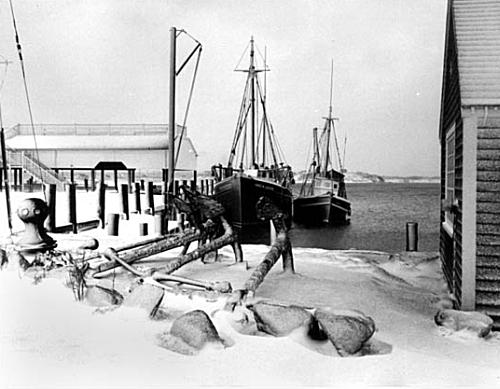
Dutcher Dock
Menemsha, 1962
Alfred Eisenstaedt
b. Dec. 6, 1898
1 2 3 4
_______________________
Review of Nina Power's One Dimensional Woman
roger gathman
news from the zona
The book is both a plea for a useable past and a summing up of the dreadful uses made of feminism in the 00s: the bad faith feminism that provided the cynical grounds for our neo-colonialist adventures in Iraq and Afghanistan, shoulder to shoulder, of course, with Saudi Arabia, that paragon of women’s rights; or the extension of feminism to mean, anything connected with a powerful woman, however dubious her politics or economics; or the Sex and the City feminism that normalized the independent woman as a consumer of gourmet chocolates and a really really fun person who happens to be oh so charmingly for equal rights for women.(....)
In particular, Power figured out how to lower the ego of the blog. Many blogs – and mine included – are long arias of me, which can get tedious over time. Power, however, uses language as something that she can stumble over, transforming egotism into slapstick. This isn’t British self effacement, but a sort of juggler’s fumble. All of those funny “erms” and curve ball rhetorical questions in her blog posts have a function. It is through these techniques that she establishes an intimacy with the reader – for the fumble is a hand outstretched. It is a contact. It is a gesture that reminds us of the author’s sovereign right to touch. Benjamin, in his essay on Leskov, speaks of the tactile moment in the story, when the storyteller touches the listener, puts his hand on the listener’s shoulder. That self-interruption, that way of making the language something that actually comes off the tongue and is thus heir to a death no word itself could feel, is an extremely subtle move in the internet world – it is a quick, golden flash – and you have to look for it - for mostly, on the internet, every intimacy has been mimicked to death, and the storyteller’s touch turns out to be the cold, cancerous hand of corporate speak, poking you in the eye.(....)
I am extremely sympathetic to her viewpoint – I believe Power is advocating for the sociability of pleasure, or what used to be called “volupté.” Thus, she mostly avoids the pitfalls of the sterile opposition between pornography and erotica – and, though it may seem like an oxymoron, she calls for something like a Habermasian pornography (I never, ever thought I would put those two things together! The universe truly is the Library of Babel, and everything will eventually conjoin with everything else)....(more)
Nina Power's blog - infinite thØught
One Dimensional Woman_______________________
 Alfred Eisenstaedt
1965
_______________________
Form as response to doubt
Lydia Davis
HOW(ever)
Vol. 4, No. 2 (October, 1987)
Editor: Kathleen Fraser
Doubt, uneasiness, dissatisfaction with writing or with existing forms may result in the formal integration of these doubts by the creation of new forms, forms that in one way or another exceed or surpass our expectations. Whereas repeating old forms implies a lack of desire or compulsion, or a refusal, to entertain doubt or feel dissatisfaction.
To work deliberately in the form of the fragment can be seen as stopping or appearing to stop a work closer, in the process, to what Blanchot would call the origin of writing, the center rather than the sphere. It may be seen as a formal integration, an integration into the form itself, of a question about the process of writing.
It can be seen as a response to the philosophical problem of seeing the written thing replace the subject of the writing. If we catch only a little of our subject, or only badly, clumsily, incoherently, perhaps we have not destroyed it. We have written about it, written it, and allowed it to live on at the same time, allowed it to live on in our ellipses, our silences.
_______________________
...the quiddity of things, which is the truth of beings, is unattainable in its purity; though it is sought by all philosophers, it is found by no one as it is. And the more deeply we are instructed in this ignorance, the closer we approach to truth.
-
Nicolas Cusanus, Of Learned Ignorance [pdf], 1440
Full text translated by Jasper Hopkins with extensive commentary
_______________________
The Quids
Laura (Riding) Jackson
(1901-1991)
The little quids, the million quids,
The everywhere, everything, always quids,
The atoms of the Monoton--
Each turned three essences where it stood
And ground a gisty dust from its neighbors' edges
Until a powdery thoughtfall stormed in and out,
The cerebration of a slippery quid enterprise.
Each quid stirred.
The united quids
Waved through a sinuous decision.
The quids, that had never done anything before
But be, be, be, be, be,
The quids resolved to predicate
And dissipate in a little grammar.
Oh, the Monoton didn't care,
For whatever they did--
The Monoton's contributing quids--
The Monoton would always remain the same.
A quid here and there gyrated in place-position,
While many essential quids turned inside-out
For the fun of it
And a few refused to be anything but
Simple, unpredicated copulatives.
Little by little, this commotion of quids,
By threes, by tens, by casual millions,
Squirming within the state of things--
The metaphysical acrobats,
The naked, immaterial quids--
Turned inside on themselves
And came out dressed,
Each similar quid of the inward same,
Each similar quid dressed in a different way--
The quid's idea of a holiday.
The quids could never tell what was happening.
But the Monoton felt itself differently the same
In its different parts.
The silly quids upon their rambling exercise
Never knew, could never tell
What their pleasure was about,
What their carnival was like,
Being in, being in, being always in
Where they never could get out
Of the everywhere, everything, always in,
To derive themselves from the Monoton.
But I know, with a quid inside of me,
But I know what a quid's disguise is like,
Being one myself,
The gymnastic device
That a quid puts on for exercise.
And so should the trees,
And so should the worms,
And so should you,
And all the other predicates,
And all the other accessories
Of the quid's masquerade.
_______________________

An American Block
Alfred Eisenstaedt
1943
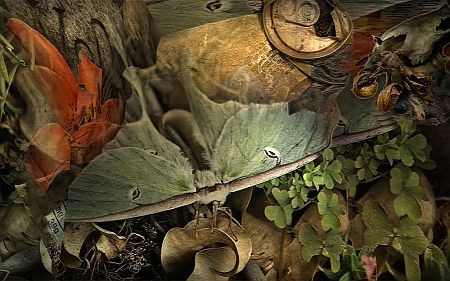
"Syzygy V"
Peter Ciccariello
first place winner
Digitalism II
Museum of Computer Art
congratulations Peter
invisible notes
_______________________
Draft 81: Gap
Rachel Blau DuPlessis
Blackbox Manifold
Day of Silence, with newspapers.
Pitch. Of silence.
Can one understand it?
No one knows why.
Aren’t there many reasons?
Yes, but finally.
Can one turn it inside out?
It is probably irreducible.
It is impossible in large, and unbelievable in little.
Couldn’t those terms also be reversed—
unbelievable in large and impossible in little?
But that’s not changing any impact.
(....)
Maybe “normalized” or “normative” is what I mean.
Meaning loses meaning,
But must still be kept in mind.
No one could invent this.
But someone had to, and others entered their premise.
The door was open, triumphant, trenchant,
With acts, specifications, and deeds,
With tortuous articulations of
intricate and particular events.
Stripped stuff in categories,
And a serious attempt to blow up the evidence.
It is a wall in consciousness of dead air and concrete
That reads out as fenced acreage.
A box of black for everything.
What is everything; what is nothing?
The word is a strange word, but now it is bound to you.
Let the word be bound to you, thongs bind the word
Right between your eyes.
...(more)
.....................................................
Blackbox Manifold
_______________________

photo - mw
_______________________
Consciousness
Attila József
Translated by Zsuzsanna Ozsváth and Frederick Turner
hungarian quarterly
(....)
4.
Just like split firewood stacked together,
the universe embraces all,
so that each object holds the other
confined by pressures mutual,
all things ordained, reciprocal.
Only unbeing can branch and feather,
only becoming blooms at all;
what is must break, or fade, or wither.
5.
Down by the branched marshaling-yard
I lurked behind a root, fear-stricken,
of silence was the living shard,
I tasted grey and wierd-sweet lichen.
I saw a shadow leap and thicken:
it was the shadow of the guard--
did he suspect?--watched his shade quicken
upon the heaped coal dew-bestarred.
6.
Inside there is a world of pain,
outside is only explanation.
The world's your scab, the outer stain,
your soul's the fever-inflammation.
Jailed by your heart's own insurrection,
you're only free when you refrain,
nor build so fine a habitation,
the landlord takes it back again.
...(more)
_______________________

Photographs from the 1950s to the 1970s
Ikko Narahara
Galerie Priska Pasquer via
_______________________
Geoffrey Hill, Collected Critical Writings
Review by Adam Piettee
Blackbox Manifold
For all readers of poetry, locked into our mind’s black boxes, subject to the many exactions of this our own culture, the essays demonstrate one hard way to live in language: through resistance, fidelity to attention, ethical suspicion of the drifts of mind flesh is heir to, and a tough-minded honouring of the example of the dead. Hardly anybody alive will follow Hill’s way – but there it nevertheless is, his monumental defence of an ethical poetics....(more)
_______________________

Ikko Narahara
_______________________
Capitalist Realism
Is there no alternative?
Mark Fisher
reviewed at ads without products
It’s not even the standard story about privatization that Mark is ultimately telling here, though it’s a related story. Rather, Capitalist Realism is ultimately focused on something else – the ways that public institutions that haven’t and likely won’t be privatized have been forced (have been forced to) to participate in simulated markets, where a rigorous regime of testing on a set of metrics replaces the invisible hand of the market. It’s a governmental gambit driven at once by a desire to reduce funding across the board and to convince voters that they are taking the efficacy of public institutions very seriously. Since it couldn’t / can’t actually expose some public institutions to market forces through opening competition or privatization, New Labour established (and continues to establish) pseudo-markets, fake market-like games, for public institutions to compete in in order to obtain funding....(more)
_______________________
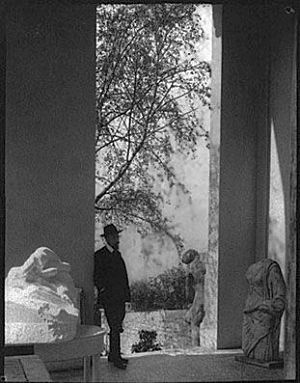
Rainer Maria Rilke
(4 December 1875 – 29 December 1926)
Excerpts from the Duino Elegies
Rainer Maria Rilke
translated by John Waterfield
The Fourth Elegy
O trees of life, when is your winter season?
We are divided. Lack the knowledge of
migrating birds. Belated and outstripped,
we hurl ourselves suddenly on the wind
to tumble on a pond of misconceptions.
Both growth and withering present to our minds.
And somewhere lions wander in their glory,
and know in all their days no dearth of power.
We, though, where we intend one thing, and mean it,
are vexed by shimmering alternatives.
Enmity’s near to hand. Don’t lovers always
come upon fences in each other’s souls
where they expected hunting, home, and freedom?
...(more)
Duino Elegies: A Bilingual EditionRainer Maria Rilke translated by Stephen Cohn google books
Letters to a Young Poet
Rainer Maria Rilke translated by Joan M. Burnham google books
Sonnets to Orpheus
Rainer Maria Rilke
translated by David Young google books
_______________________
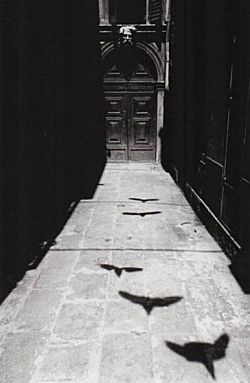
Ikko Narahara
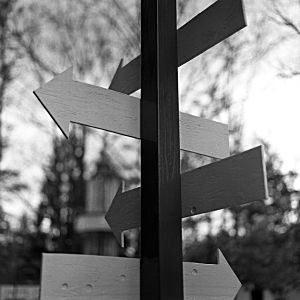
Closed for winter....
Knobels Amusement Park
Elysburg, PA.
Adam Marcinek Photography
_______________________
Vermin: A Notebook
Poems can stop bulldozers
John Kinsella
On a personal level, it came as a kind of foil for the weekend-that-was—a complex amalgamation of environmental affirmation and also witnessing of horrific environmental crime. The sort of experience that leaves you wondering if any form of environmental activism has any chance of succeeding, yet nonetheless also convinced that there is no choice about acts of resistance. Without them, the environment has no chance.
And writing a statement like this is part of a process of creating poems that hopefully resonate in different ways and in different contexts, and extend what is a particularly local debate into the wider dialogue of which, sadly, it is also part. The compulsion to witness in poetry, the desire to overcome a feeling of crushing failure, and the need to create a cautionary tale that is more than propaganda—all this goes hand-in-hand with a volatility and (maybe overly) emotional reaction to the situations as they happen.
I can see the poem forming in my head as I am raging against an act of destruction, not as a fetishized aesthetic “response,” but in the struggle to formulate a language of reply that is not aggressive and thus self-defeating and hypocritical. I am being somewhat obtuse here. To begin at one possible beginning . . ....(more)
_______________________
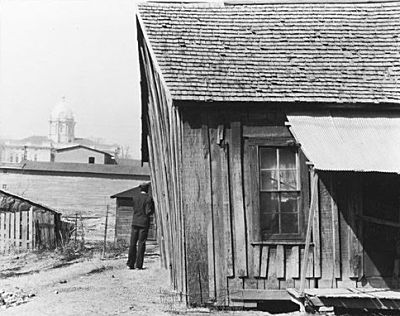
Images of the Great Depression: A Photographic Essay
Robert L. Stevens and Jared A. Fogel
AMERICANSUBURB X: THEORY
You may ask yourself, what is the legacy of the Farm Security Administration (FSA) photographs? Was their value "in the record itself, which in the long run will prove an intelligent and farsighted thing to have done," as Walker Evans asserted? Or if they were "subversive propaganda," precisely what about them was subversive? If one defines "subversive" as that which works against the prevailing system or government, then we are at a bit of a stalemate. As a product of Franklin D. Roosevelt's New Deal, these photographs obviously did not constitute an attempt to overthrow the government, or even weaken it. Quite the opposite, in fact, was true. But if one sees the true "subversion" not as a weakening of the federal government, but as a direct challenge to the capitalist system, then the term "subversive" may have some merit....(more)
_______________________
Pundits talk about "populist rage" as a way to trivialize the anger and fear coursing through the middle class. But they have it wrong. Families understand with crystalline clarity that the rules they have played by are not the same rules that govern Wall Street. They understand that no American family is "too big to fail." They recognize that business models have shifted and that big banks are pulling out all the stops to squeeze families and boost revenues. They understand that their economic security is under assault and that leaving consumer debt effectively unregulated does not work.
Elizabeth Warren, America Without a Middle Class
via pas au-delà
_______________________

The Timid Proud One
1957
Asger Jorn
1914-1973
_______________________
AsgerJorn's Avant-Garde Archives
Claire Gilman
Memoires is predicated on the alienating effect of language, specifically as it
enters the domain of the aesthetic object. As archival recollection, the book conjures
up "the epoch [that] itself is the frame of the whole work" at the same time as it
relegates those moments to mere shadows. The anguished voice that speaks
through anonymous phrases calls to mind Foucault's fictitious interlocutor from
The Archaeology of Knowledge: "What! All those words, piled up one after another, all
those marks made on all that paper ... all that and nothing remaining of the poor
hand that traced them, of the anxiety that sought appeasement in them, of that
completed life that has nothing but them to survive in? ... Must I suppose ... that
in speaking I am not banishing my death, but actually establishing it?"
in October #79 (Special issue on Guy Debord and the Situationists) aaaarg - free reg. req.
_______________________
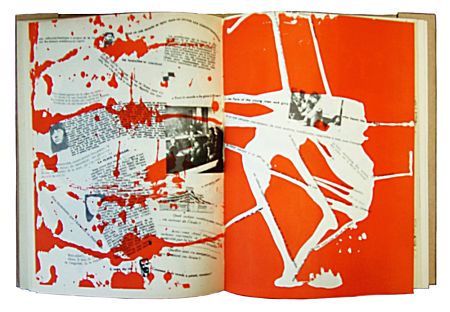
Mémoires
Asger Jorn and Guy Debord
1959
Books of Warfare:
The Collaboration between Guy Debord & Asger Jorn from 1957-1959
Christian Nolle
Vector
_______________________
Studying the Language
Eiléan Ní Chuilleanáin
On Sundays I watch the hermits coming out of their holes
Into the light. Their cliff is as full as a hive.
They crowd together onto warm shoulders of rock
Where the sun has been shining, their joints crackle.
They begin to talk after a while.
I listen to their accents, they are not all
From this island, not all old,
Not even, I think, all masculine.
They are so wise, they do not pretend to see me.
They drink from the scattered pools of melted snow:
I walk right by them and drink when they have done.
I can see the marks of chains around their feet.
I call this my work, these decades and stations —
Because, without these, I would be a stranger here. The Brazen Serpent (Wake Forest University Press, 1995)
/BLOCKQUOTE>
.....................................................
Strangers
Roddy Lumsden and Eiléan Ní Chuilleanáin make it weird
Peter Campion
If there are virtues specific to poetry, maybe the least discussed remains its ability to estrange. Shaped from language, the very medium in which we all consider ourselves experts, poems possess a distinct power to turn the familiar suddenly weird. Estrangement doesn’t always match up with difficulty or with technical innovation. Robert Duncan, for example, seems to me a less estranging poet than Robert Frost. Duncan, the great experimenter, most often worked by establishing startling new connections (he called them “rimes”) from out of his personal phantasmagoria. Frost, on the other hand, rooted his dramas and meditations in the home, the farm, and the nearby woods, and his prosody in the English metrical tradition, yet he worked continually to unsettle given habits of mind and feeling. As they course toward their endings, his poems leave the reader to confront fissures in the very surface of reality: a neighbor carrying stones looks for a second like a caveman, the headboard of a mother’s bed hides the attic where the bones of her erstwhile lover crumble, a picturesque winter landscape opens into vertiginous “desert places.” That’s how genuinely estranging poems operate: they lead us to some impasse, whether bewildering or wondrous or both, where our imagination and intellect must begin anew. We must start all over again on what the late Richard Poirier once called “the work of knowing.”
...(more)
.....................................................
Early Recollections
Eiléan Ní Chuilleanáin
If I produce paralysis in verse
Where anger would be more suitable,
Could it be because my education
Left out the sight of death?
They never waked my aunt Nora in the front parlour;
Our cats hunted mice but never
Showed us what they killed.
I was born in the war but never noticed.
My aunt Nora is still in the best of health
And her best china has not been changed or broken.
Dust has not settled on it; I noticed it first
The same year that I saw
How the colours of stones change as water
Dries off them after rain.
I know how things begin to happen
But never expect an end.
...(more)
Eiléan Ní Chuilleanáin
Eiléan Ní Chuilleanáin at Poetry International Web
Roddy Lumsden
via The Page
_______________________
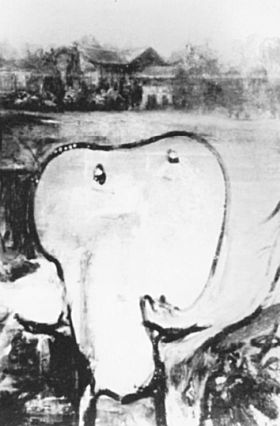
Story of the North
AsgerJorn
_______________________
Words without Borders
December 2009: Out Of This World: International Science Fiction
.....................................................
A Visit from Alcibiades
Machado de Assis
Translated from the Portuguese by Clifford E. Landers
A Letter from Appeals Court Judge X to the Chief of the Imperial Court Police
The Court, September 20, 1875
Your Excellency must excuse the tremulous handwriting and the rambling style, both of which will soon be better understood.
Today, in late afternoon, after dinner as I awaited the time for the Casino, I stretched out on the sofa and opened a volume of Plutarch. Your Excellency, who were my classmate, will recall that since early days I have suffered from this devotion to things Greek; devotion or mania, which is what Your Excellency termed it, so intense that it was causing me to fail the other disciplines. I opened the volume, and there occurred what always happens when I read something ancient: I am transported to the period and the midst of the action or of the work. After dinner is an excellent time. I quickly find myself on a Roman street, at the foot of a Greek portico, or at the stoa of a grammarian. Modern times disappear, the insurrection in Herzegovina, the Carlist wars, Ouvidor Street, the Chiarini circus. Fifteen or twenty minutes of ancient life, and free of charge. A true literary digestion.
That is what happened today. The open page chanced to be the life of Alcibiades. ...(more)
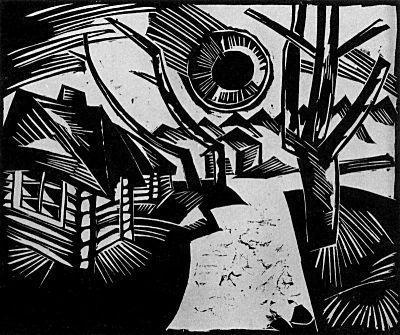
Woodcut
1919
Karl Schmidt-Rottluff
b. December 1, 1884
_______________________
Athens: Peripatetic Fragments
A new world in the old.
A.E. Stallings
All street signs are in the genitive. The road of Heraclitus. So, too, are the surnames of women. She of Psaropoulos. Patronymics. Who are you=to whom do you belong.
* * *
(....)
Some call my neighborhood Neos Kosmos, the New World. But we are on the borders of Neos Kosmos. We live across the paved-over trickle that was the river, Kallirrhois (“the beautifully flowing”), from the old-town area of Athens, the Plaka, where, on Byron street, beneath the Acropolis, you can buy calendars with ancient Greek pornography. The real name of our neighborhood, known by the post office but none of the taxi drivers, is Cynosargous—the dog Argos, who waited on a dungheap for the exile’s return. The exile’s return, of course, is death.
Cynosargous is the ancient home of the Cynics.
* * *
We are a ten-minute walk from the Próto Nekrotapheío—the First Cemetery, on the Road of Repose. It is our nearest real park, that is, one without mopeds tearing past kids playing soccer in the dust (city grime, and the ochre dust from the Sahara that rains down twice a year), shouting Albanian obscenities. The cemetery is good for picnics: the cooing of doves under vaults of cypresses amidst the everyday bustle of death: priests, florists, marble cutters, the cafes that serve bitter coffee and brandy to mourners. Our neighbors include George Seferis, Heinrich Schliemann, and T.H. White. They are lucky: most inhabitants have to be dug up in three years to make room for the rattle of new skeletons. My therapist, Dr. Agamemnon, has his office overlooking the cemetery. Guilt, he says, is a poor counselor. O inscrutable gold mask!
* * *
“When will they return our lost marbles?”
* * *
More neighbors: Penelope has finished her web. She is cutting the threads, weaving in the loose ends. A shroud all along. She is one of those little old ladies dressed in black, in widow’s weeds, who elbow me out of the way in the checkout line at the supermarket. I must learn how better to take up space.
Laertes is already planted in the ground. His heart lies there, full of seeds, ready to break open like a grenade, like a pomegranate. They break them here for luck and for new beginnings. Pomegranates, I mean, not hearts.
Telemachus runs a moving company. His truck is labeled: Metaphors....(more)
via riley dog
_______________________

The Sound
Karl Schmidt-Rottluff
1909
_______________________
Containment
A.E. Stallings
So long I have been carrying myself
Carefully, carefully, like a small child
With too much water in a real glass
Clasped in two hands, across a space as vast
As living rooms, while gazes watch the waves
That start to rile the little inland sea
And slap against its cliffs' transparency,
Revise and meet, double their amplitude,
Harmonizing doubt from many ifs.
Distant frowns like clouds begin to brood.
Soon there is overbrimming. Soon the child
Looks up to find a face to match the scolding,
And just as he does, the vessel he was holding
Is almost set down safely on the bookshelf.
_______________________

Brooklyn Bridge from Ferry Slip
1912
Karl Struss
1886 - 1981
_______________________
Why No One Wants to be a New Formalist
A.E. Stallings
People come up with other terms: Expansive poet, poet-who-happens-to-write-in-form (and I write free verse too, they hastily exclaim), formalista. In fact, when I started blogging, I realized to my horror that my bio at Harriet-not one I wrote myself-identified me as one of the prominent voices of the next generation of (flattering so far)… New Formalism! Noooo! Kiss of death! Immediately I wrote Emily and had her change my bio, in which all mention of formalism (why -ism, which suggests some kind of dogmatic agenda? Is there an innovation-ism?) is now expunged.
If I have to be labeled, I myself prefer the term "retro-formalist", which at least sounds vaguely cool, like wearing vintage clothing and listening to vinyl, something so square it's hip.
So what is NF? Just who ARE these embarrassing people? British poets who work in form and meter are apparently just being… British (that Modernism stuff was all very American and Continental after all), i.e., old formalists. New Formalists have to be American for some reason. Is it people who have studied with Yvor Winters? People who returned to form and painfully relearned prosody from manuals after an apostasy in free verse? People who write screeds against a Modernism that was actually better grounded in craft and tradition than most working poets today? People who write exclusively in form? People who capitalize their lines? People who have published in a formal journal or attended West Chester, a craft-focused conference in Pennsylvania (where, yes, I have had the opportunity of both taking and teaching classes)?
Glibness aside, though, do I feel belligerent against free verse? No, I admire good free verse, I wish I wrote it better. Tennis without a net has its own beauties and choreography. But I write best (as more than one editor has pointed out to me when I tried to sneak in some free verse in a submission) when I write against the constraint and pressures of form-any constraint, really, be it syllabic, repetend, stanzaic, metrical, rhyme-schemed. I write… freer that way....(more)
A.E. Stallings homepage (archived)
_______________________

Chicago 1946 - 48
Wayne Miller
Magnum In Motion _______________________
Waiting For The Political Moment
Call for papers
Some, like Beck and Giddens, have suggested that we no longer need a political moment, or classical notions of political action, since we live in a post-political era. Some, like Žižek, have proposed refraining from action for the time being in order to study and analyse our present situation and to discern what causes the structural violence within capitalism and its political regimes. (The attempt here would appear to be analogous to the 'fail again, fail better' of Beckett in Worstward Ho.) Then there are those that have called for a vigorous revitalisation of antagonism in politics. Others believe they have spotted novel forms for concerted action in relation to global politics and economy. Finally, there are those who have detected the recurrence of revitalised state capitalism on the grounds of an almost unassailable fusion of the post-national state and global capitalism.
To come to grips with the political moment we not only need to understand our current moment; we must also have an idea of how the conceptualization of the political moment developed over time. That is to say, instead of considering the political moment from an exclusively contemporary point of view, or from an exclusively political angle, Waiting for the Political Moment will focus on the intertwinement of politics, capitalism and/or aesthetics from the late Middle Ages to the present day.
The conference will take place in Rotterdam and Utrecht, June 17-19 2010
via Farhang Erfani (Continental Philosophy)
_______________________
The Urgent Threat to World Peace is … Canada
George Monbiot
So here I am, watching the astonishing spectacle of a beautiful, cultured nation turning itself into a corrupt petrostate. Canada is slipping down the development ladder, retreating from a complex, diverse economy towards dependence on a single primary resource, which happens to be the dirtiest commodity known to man. The price of this transition is the brutalisation of the country, and a government campaign against multilateralism as savage as any waged by George Bush.
(....)
Canada is a cultured, peaceful nation, which every so often allows a band of rampaging Neanderthals to trample all over it. Timber companies were licensed to log the old-growth forest in Clayaquot Sound; fishing companies were permitted to destroy the Grand Banks: in both cases these get-rich-quick schemes impoverished Canada and its reputation. But this is much worse, as it affects the whole world. The government’s scheming at the climate talks is doing for its national image what whaling has done for Japan.
I will not pretend that this country is the only obstacle to an agreement at Copenhagen. But it is the major one. It feels odd to be writing this. The immediate threat to the global effort to sustain a peaceful and stable world comes not from Saudi Arabia or Iran or China. It comes from Canada. How could that be true? ...(more)
_______________________
As long as Stephen Harper’s government holds the reigns of power, Canada will remain a global environmental pariah.
- James Laxer
_______________________
Spinoza and philosophers today
Gábor Boros, Herman De Dijn, Moira Gatens, Syliane Malinowski-Charles, Warren Montag, Teodor Münz, Steven B. Smith
eurozine
Spinoza's rationalist philosophy was central to the "radical" Enlightenment of late seventeenth century Europe and a century later had a decisive impact on the development of German Idealism. At the beginning of the twentieth century, his critique of revealed religion was the focus of heated discussions among Jewish thinkers; and in the 1960s Marxist philosophers, including Althusser, saw Spinoza's understanding of the imagination as a forerunner to the concept of ideology. This strand of his thought was taken a step further by Hardt and Negri in their highly influential work Empire, while most recently António Damásio has argued that there are significant affinities between Spinoza's psychology and contemporary discoveries in neurophysiology. In the following interview, leading Spinoza experts discuss the seventeenth-century philosopher's relevance today.
_______________________
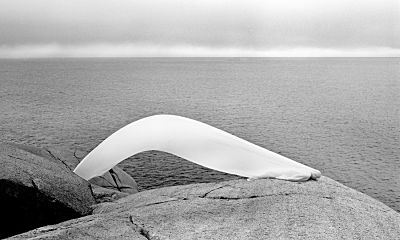
Rune Guneriussen
_______________________
Precarious Life: The Powers of Mourning and Violence
Judith Butler
pdf at aaaaarg
free reg. req.
from the Preface
"Precarious Life" approaches the question of a non-violent ethics, one that is based upon an understanding of how easily human life is annulled. Emmanuel Levinas offers a conception of ethics that rests upon an apprehension of the precariousness of life, one that begins with the precarious life of the Other. He makes use of the "face" as a figure that communicates both the precariousness of life and the interdiction on violence. He gives us a way of understanding how agression is not eradicated in an ethics of non-violence; aggression forms the incessant matter for ethical struggles. Levinas considers the fear and anxiety that aggression seeks to quell, but argues that ethics is precisely a struggle to keep fear and anxiety from turning into murderous action. Although his theological view conjures a scene between two humans each of which bears a face that delivers an ethical demand from a seemingly divine source, his view is nevertheless useful for those cultural analyses that seek to understand how best to depict the human, human grief and suffering, and how best to admit the "faces" of those against whom war is waged into public representation. _______________________
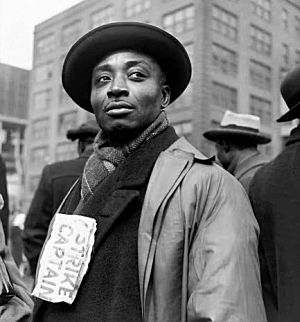
Wayne Miller
Stephen Daiter Gallery
|


 Janus Head
Janus Head

 The Age of Briggs & Stratton
The Age of Briggs & Stratton
































































